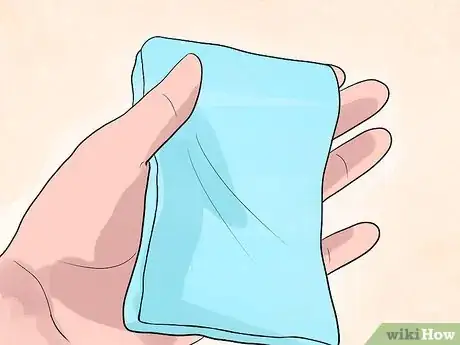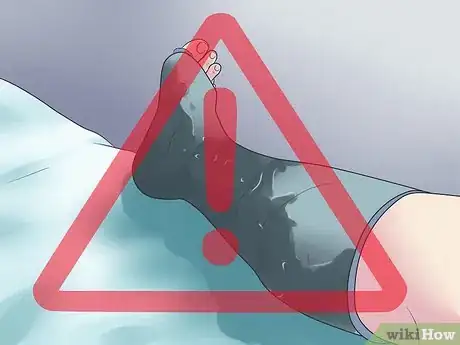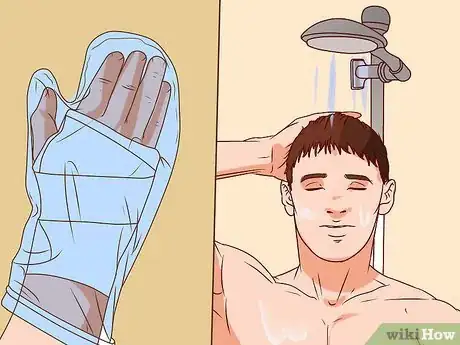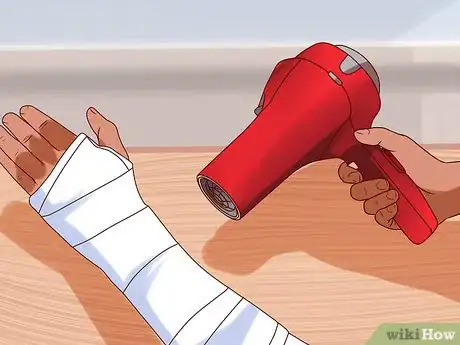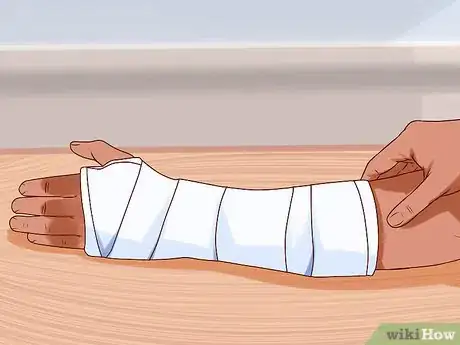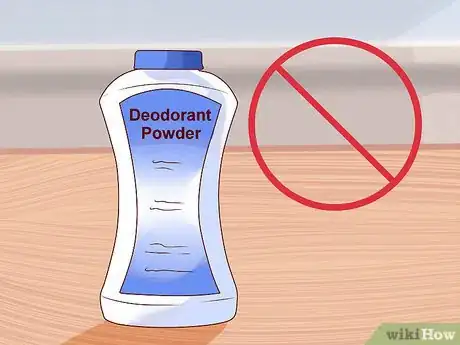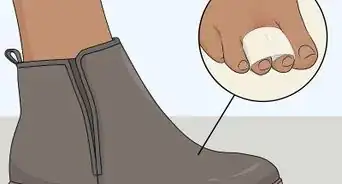This article was medically reviewed by Jennifer Boidy, RN. Jennifer Boidy is a Registered Nurse in Maryland. She received her Associate of Science in Nursing from Carroll Community College in 2012.
There are 11 references cited in this article, which can be found at the bottom of the page.
This article has been viewed 62,992 times.
Casts are used when you break a bone. They help stabilize the broken bone to let it to heal. Casts are made with either fiberglass or plaster. Most fiberglass casts are waterproof, although their liner is not unless you have a special waterproof liner. However, plaster casts have to remain dry, because water may dissolve them. Cleaning plaster casts can be difficult. When you have a plaster cast, make sure you keep it from getting dirty and from getting wet. If you have to, wipe it down with a damp cloth to remove dirt and grime.
Steps
Cleaning the Cast
-
1Wipe the outside of the cast with a damp cloth. If you happen to get your fiberglass cast dirty, try wiping off the dirt, food, or other mark with a damp cloth.[1] Make sure the cloth is only damp and not too wet. It should not leave any pools of wetness behind on your cast.
- No matter if you have a plaster or fiberglass cast, you should never get your cast wet or submerge it into water, even if you get it dirty. Though fiberglass casts are waterproof, the soft lining inside is not, so you want to keep them dry.[2]
- If you have a fiberglass cast and a waterproof liner, you may be able to get the cast wet.
-
2Use mild detergent to clean your cast. If either type of cast gets dirty on the outside and a damp cloth isn’t enough, try using mild dish detergent. Put a small amount of dish detergent on a damp cloth. Gently and carefully wipe away the dirt.[3]
- Use a dry cloth to wipe away the soap and dry the cast.
Advertisement -
3Keep the cast from getting dirty. The most important thing to do while you or someone else has a cast is to keep it clean. This means keeping it away from dirt and sand if possible. You should also try to limit how much you sweat in it, because sweat and grime can cause it to get dirty.[4]
- Be careful when you eat. Try not to drop food onto or into the cast. If you need to, cover the cast while you eat. This may be important if a child has an arm cast.
Keeping Your Cast Dry
-
1Protect the cast when you bathe or shower. When you take a bath or shower, put plastic around the cast and don’t put that part of your body into the water. You can use plastic bags or trash bags secured with waterproof tape to help keep your arm dry.[5]
- When you are taking a bath, you must not get your cast wet even if you have a fiberglass cast. Don’t try to wash the cast in the shower.
- It may be easier to give children a sponge bath to ensure that their cast stays dry.[6]
- If your fiberglass cast has a waterproof liner, you might be able to take a shower. Ask your doctor before you try.
-
2Dry your plaster cast with a hairdryer on cool. If you happen to get your plaster cast wet, or you sweat inside your cast, you need to dry it inside and out. To do this, use a hairdryer set to the cool setting. This will provide air that will dry any moisture inside and outside of the cast.[7]
- Don’t use the hairdryer set on the warm or hot setting. This can burn the skin and cause problems. It can also cause more sweating and moisture in the cast.
-
3Let a fiberglass cast dry naturally. Your fiberglass cast with a waterproof liner can get wet, either in the shower or swimming pool.[8] After you get out of the water, it will take around an hour for the inside of the cast to dry. Be patient and let the cast dry naturally.
- Don't use a hairdryer to try to dry the fiberglass cast faster. Don't stick a towel in or around the fiberglass cast.
Taking Care of Other Concerns with Your Cast
-
1Use care with body casts when going to the bathroom. Body casts can be difficult to deal with and keep clean, especially when going to the bathroom. You want to make sure that if you or your child has a body cast, you do not get urine on the cast.[9]
- Find a way to prevent splashing urine onto the cast, such as toilet paper in the bedpan.
- Make sure no urine rolls along the skin into the cast. Wipe away the urine immediately.
-
2Avoid using deodorizers. You may want to use something to help with the smell of the cast or to help keep it clean. However, don’t do this. This can lead to more grime and problems, especially inside the cast. Keep those types of things away from the cast.[10]
- For example, don’t place lotions, powder, or deodorants on, inside, or near the cast.
-
3Determine the type of cast you have. Though taking care of a fiberglass or plaster cast is similar, there are important distinctions between the two. Make sure you know what kind of cast you have and the type of liner you have so you can care for your cast properly.[11]
- Fiberglass casts can hold up better if they happen to get wet. However, you should not submerge them in water, go swimming with them, or take a shower with them if you have a normal liner. The liner can get wet and irritate or cause sores on your skin inside the cast.
- Some fiberglass casts come with waterproof liners. If you have a waterproof liner, you may be able to submerge it in water, but only with your doctor's approval. For example, you may be able to go swimming or take a bath with it.
- Plaster casts cannot get wet. Water can damage the cast and cause problems. It may even possibly cause the cast to dissolve and fall apart. You should take care to always keep your plaster cast dry.
-
4Know when to see the doctor. If you get the cast completely wet somehow, you may need to see a doctor. Sometimes, a wet cast will completely dry, but often, a wet cast won’t dry completely, and it will cause sore spots on your skin inside the cast.[12]
- You should call the doctor if you notice:
- Pain and tightness in the injured limb
- Numbness or tingling in the injured hand or foot
- Burning or stinging under the cast
- Injured fingers or toes of injured limb becoming cold or blue
- Inability to move fingers or toes of injured limb
- Swelling below the cast
- Red or raw skin around the cast
- Fever of 101F (38C) or higher[13]
- If the cast gotten wet but has not dried after 24 hours, call the doctor.[14]
- Most casts will start to smell a little after you wear them for awhile. However, any foul or extremely bad odors are an indication of a problem. You should go see a doctor if the smell is bad because this might mean you have an infection.
- You should call the doctor if you notice:
References
- ↑ https://intermountainhealthcare.org/ext/Dcmnt?ncid=520407964
- ↑ https://kidshealth.org/en/kids/casts.html
- ↑ https://intermountainhealthcare.org/ext/Dcmnt?ncid=520407964
- ↑ http://www.dartmouth-hitchcock.org/documents/cast_care_tips.pdf
- ↑ http://www.nhs.uk/chq/pages/2543.aspx?categoryid=72
- ↑ http://kidshealth.org/en/parents/cast-faq.html#
- ↑ https://familydoctor.org/cast-care/
- ↑ https://kidshealth.org/en/kids/casts.html
- ↑ http://www.stanfordchildrens.org/en/topic/default?id=cast-types-and-maintenance-instructions-90-P02750
- ↑ http://www.mayoclinic.org/healthy-lifestyle/childrens-health/in-depth/cast-care/art-20047159?pg=2
- ↑ https://www.mayoclinic.org/healthy-lifestyle/childrens-health/in-depth/cast-care/art-20047159
- ↑ http://www.aboutkidshealth.ca/En/HealthAZ/ConditionsandDiseases/Injuries/Pages/Cast-Care-Arm-or-Leg-Cast.aspx
- ↑ http://www.mayoclinic.org/healthy-lifestyle/childrens-health/in-depth/cast-care/art-20047159?pg=2
- ↑ https://www.saintlukeshealthsystem.org/health-library/discharge-instructions-plaster-cast-care
About This Article
Cleaning your cast correctly is important so you don't damage it. If you get your cast dirty, wipe the dirt, food, or other marks off with a damp cloth. For more stubborn dirt, try putting a small amount of dish detergent on a damp cloth and gently wiping it down. Then, use a dry cloth to wipe away the soap and dry the cast. You’ll also need to keep your cast dry during daily activities. When you take a bath or shower, put plastic around the cast and try to avoid getting it into the water. For more information from our Medical co-author, including what to do if you get your cast wet, keep reading!
